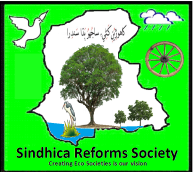Leading the Way: 97 SRS Projects Completed with Distinction
The Sindhica Reforms Society is a non-profit, nonsectarian, indigenous environmental organization based in Sindh, Pakistan. Operating since 1993, SRS has gained recognition for its unwavering commitment to environmental conservation and community development.
Accredited by the UN Environment Program and the Global Environment Facility (GEF), SRS hosts the GEF CSO Global Secretariat and serves as the Regional Focal Point for the GEF CSO network in the South regions.
Over the years, Sindhica has successfully executed 97 impactful SRS projects aligned with the Sustainable Development Goals (SDGs), addressing some of the most pressing global and local challenges.
| SDGS- COVERED UNDER THIS PROJECT | MAIN THEME | NUMBER OF PROJECTS COMPLETED |
|---|---|---|
| SDG No: 06,12,13,14 | Water Conservation /Wastewater Treatment & Recycling, Water, Sanitation and Hygiene. | 55 |
| SDG No: 13,15 | Afforestation, Reforestation, and Conservation | 13 |
| SDG No: 03,08,12,13 | Livelihood Support / Economic Growth / Promotion of Local Artisan | 08 |
| SDG No: 07,13,15 | Alternate / Renewable Energy | 06 |
| SDG No: 03 | Primary Heath Care | 04 |
| SDG No: 03 | Maternal, Newborn and Child Health | 03 |
| SDG No: 02,04,05,06,17 | Disaster response and recovery, Humanitarian Response. Prevention and Response to Gender-Based Violence | 08 |
Focus Areas and Impact
SRS’s initiatives span critical areas such as water conservation, sanitation, hygiene, environmental conservation, renewable energy, economic growth, and healthcare improvement. The SRS projects are not just about service delivery.
They empower vulnerable communities, including women, children, minorities, Indigenous groups, forest communities, and urban slum residents. Additionally, SRS is committed to the protection of natural resources, flora, fauna, and wildlife, ensuring that its environmental efforts benefit both people and the planet.
1. Water Conservation and Sanitation
A significant portion of SRS’s work has focused on water conservation, sanitation, and hygiene. The organization has implemented 55 SRS projects dedicated to improving water access, wastewater treatment, and sanitation services, particularly in areas with limited infrastructure.
These efforts contribute to SDGs 6, 12, 13, and 14, which emphasize clean water and sanitation, responsible consumption, climate action, and the conservation of marine ecosystems. By addressing these critical needs, SRS has enhanced the quality of life for many communities, ensuring access to safe and sustainable water resources.
2. Environmental Conservation and Renewable Energy
In the realm of environmental conservation, SRS has undertaken 13 SRS projects focused on afforestation, reforestation, and the conservation of natural ecosystems. These efforts align with SDGs 13 and 15, which advocate for climate action and the preservation of terrestrial ecosystems. Through these initiatives, SRS has contributed to mitigating the effects of climate change, restoring degraded lands, and promoting biodiversity.
SRS has also advanced renewable energy solutions, implementing 6 SRS projects that promote alternative energy sources, particularly in underserved areas. These SRS projects align with SDGs 7, 13, and 15, ensuring access to affordable, reliable, and sustainable energy while contributing to climate resilience.
3. Livelihood Support and Economic Growth
SRS’s commitment to community empowerment is evident in its 8 livelihood support and economic growth initiatives. The SRS projects have emphasized the promotion of indigenous and traditional crafts in Sindh, contributing to SDGs 3, 8, 12, and 13. By fostering local economic development and preserving cultural heritage, SRS has provided vulnerable communities with sustainable income-generating opportunities while enhancing their resilience to economic and environmental challenges.
4. Healthcare and Gender-Based Violence Prevention
Healthcare improvement is another cornerstone of SRS’s work. The organization has implemented 7 SRS projects focused on primary healthcare, maternal, newborn, and child health services (SDG 3). These initiatives have improved health outcomes for underserved populations, particularly in remote areas.
In addition to healthcare, SRS has prioritized gender-based violence prevention and response, aligning with SDGs 2, 4, 5, 6, and 17. The organization has undertaken 8 projects focused on disaster response, humanitarian aid, and the prevention of violence against women and girls. These efforts have created safer environments and strengthened social support systems for vulnerable populations.
Key Milestone: Constructed Wetland Module
One of SRS’s most notable achievements is the development of Pakistan’s first Constructed Wetland Module for biological wastewater treatment in Shaheed Benazirabad. This pioneering model, which treats wastewater through natural processes, has gained national recognition and is being replicated across the country.
The project not only addresses wastewater management but also promotes environmental sustainability by reducing pollution and conserving water. SRS continues to provide technical support to various national and international organizations to replicate and scale this innovative solution.
Collaboration and Recognition
SRS’s success is built on strong collaborations with donors, government agencies, civil society organizations, and the communities it serves. By working together, SRS has been able to maximize its impact, ensuring that its projects are sustainable and aligned with the needs of the people and ecosystems it supports.
The organization’s efforts have earned it national and international recognition, with numerous awards and accolades highlighting its contributions to sustainable development and social impact. SRS’s work exemplifies the power of grassroots initiatives to drive meaningful change, both locally and globally.
Conclusion
Sindhica Reforms Society has established itself as a leader in environmental conservation and community empowerment in Pakistan. Through its 97 successful projects, SRS has contributed to the achievement of the Sustainable Development Goals, addressing critical challenges such as water conservation, sanitation, renewable energy, economic growth, healthcare, and gender-based violence prevention.
The organization’s pioneering efforts, particularly in wastewater treatment, have set new standards for sustainability and innovation in the country. By continuing to collaborate with stakeholders and advocating for vulnerable communities, SRS remains committed to fostering resilience, promoting well-being, and driving long-term positive outcomes
